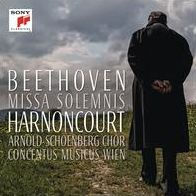
Month: October 2016
Nikolaus Harnancourt on Beethoven’s “Dona nobis pacem”
From the liner notes to Harnoncourt’s final recording:
In most settings of the Mass, the “Dona nobis pacem” is interpreted in such as a way as to suggest that peace already exists. And yet the words mean that is not peace that reigns but catastrophe. Beethoven does not say “Thank you!” but “Give!” This is particularly thrilling in the Missa solemnis. For me, this begs the question as to whether peace can exist at all. I see this psychologically. Of course, memories of the Napoleonic Wars were still fresh in people’s minds at this time, and you may be even be able to see a burning city in the music. But the battle painting tends, rather, to depict the conflict that goes on inside us. It is a plea—as Beethoven himself said—for “inner and outer peace.” And it strikes me as far more plausible that it is the inner conflict that constitutes the actual drama. The inner aspect is more important than the outer one. But this is true of each and every one of us.
Harnoncourt conducted Missa solemnis with the Concentus Musicus Wien and the Arnold Schoenberg Chor in early July 2015 in Graz, Austria. These were marvelous performances—the last of Harnoncourt’s long and distinguished career. This CD is highly recommended.
American Ideas II
Given our military might and the widespread belief that our grandest actions are divinely sanctioned, we’re convinced that we can settle any argument by force. And when we resort to force, we expect our victories to be spectacular and absolute, even if the goal is vast and improbable, such has the utter annihilation of our enemies.
For decades we’ve boasted that we can bomb any land into a parking lot. And what is a parking lot? A featureless expanse that leaves nothing to doubt.
To any expect any other outcome to our actions—for example, to anticipate adaptations from our opponents, evolving circumstances, “quagmires,” and other undesirable outcomes—would be to adopt dialectical thinking, a mode favored during the Cold War by Marxists and Hegelians, a tribe over whom we claim yet another of those victories we consider absolute.
For too many Americans, complexity is error. We can blast the shit out of anything, and the next thing, and the next. Especially in the face of intractable problems, bludgeoning is the true American argumentum.
Fall Colors

“Something Artistic”
“The Courvoisiers were equally incapable of rising to the spirit of innovation which the Duchesse de Guermantes introduced into the life of society and which, by adapting it with an unerring instinct to the necessities of the moment, made it into something artistic, where the purely rational application of cut and dried rules would have produced results as unfortunate as would greet a man who, anxious to succeed in love or in politics, reproduced to the letter in his own life the exploits of Bussy d’Amboise.”
—Proust, The Guermantes Way (p. 641)
By the Pond

